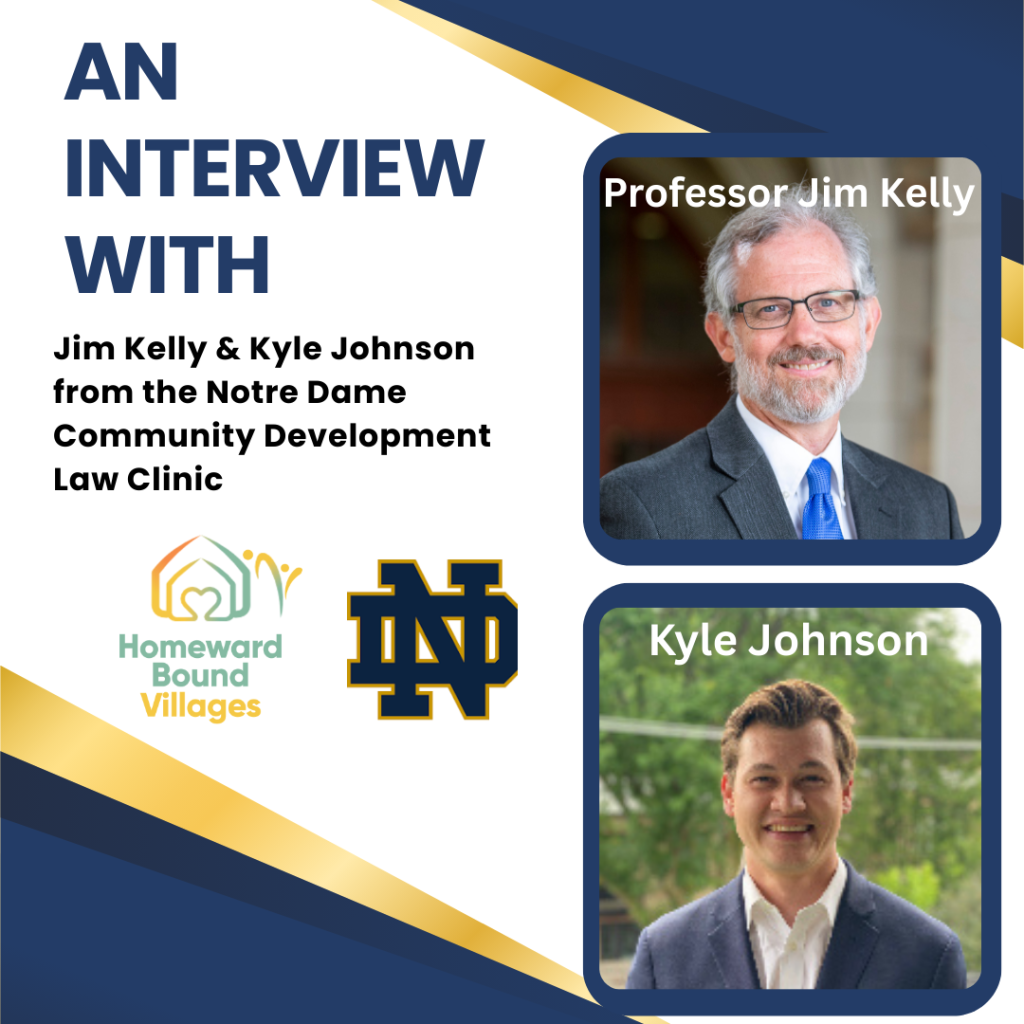At Homeward Bound Villages, we’re excited about the progress of Karwick Village, our cooperative housing initiative designed to provide permanently affordable housing in La Porte County. Behind the scenes, a crucial partnership has been developing with the Notre Dame Community Development Law Clinic, whose expertise is helping us create the legal foundation for this innovative housing model.
What is the Notre Dame Community Development Law Clinic?
The Notre Dame Community Development Law Clinic was established 14 years ago by Professor Jim Kelly, who brought his experience from teaching a similar clinic in Baltimore for seven years. The clinic serves a dual mission: providing transactional legal services to nonprofits and small businesses in the community while offering law students practical, hands-on experience.
“Each semester, we work with about eight students to help approximately 20 to 24 clients,” explains Professor Kelly. “A little more than half of them are nonprofits, with the remainder being small businesses from the community or student businesses exploring innovative ideas.”
The clinic operates under an Indiana practice rule that allows law students who have completed at least half of their law school education to practice law under the supervision of a licensed Indiana attorney. This arrangement creates a win-win situation—organizations like Homeward Bound Villages receive essential legal services at no cost, while students gain invaluable real-world experience.
Why Partner with the Law Clinic for Karwick Village?
The Notre Dame Law Clinic’s expertise is invaluable for Karwick Village Cooperative. Law student Kyle Johnson has been working closely with our team to develop the organizational documents for Karwick Village.
“We talked about forming a nonprofit corporation in the state of Indiana, rather than a for-profit corporation,” Kyle explains. “This allows more flexibility to keep the housing affordable permanently.”
This approach is particularly important in Indiana, which, unlike some other states, doesn’t have a specific cooperative statute. Instead, cooperatives here form as nonprofit entities and then create the cooperative structure within their organizational documents, primarily the bylaws, lease agreements, and membership agreements.
While Homeward Bound Villages could have attempted to create these legal structures independently, the Law Clinic brings specialized knowledge that helps navigate Indiana’s specific legal landscape. Professor Kelly notes, “While there are good documents out there, for instance from groups in Oregon, differences between Oregon law and Indiana law might make them less suitable for a co-op here in Indiana.”
Additionally, as a law school clinic, their services are free—one less thing for our organization to fundraise for.
Creating a Framework for Democratic Control and Affordability
The legal documents being developed by Kyle and the Law Clinic team will establish two crucial elements for Karwick Village:
- Democratic decision-making by residents: The bylaws will provide for voting rights and establish how residents control their living situation, from maintenance decisions to community rules.
- Permanent affordability: Through the relationship between Homeward Bound Villages and Karwick Village Cooperative, the housing will remain affordable for the long term, even as residents come and go.
“These hopefully can empower the individual residents to have control over their living situation, especially if they haven’t had that opportunity in the past,” Kyle explains. “They’ll have the individual power to make the community that they envision living in, while at the same time, always having the support of Homeward Bound Villages.”
In this model, Homeward Bound Villages will own the land and buildings, leasing them to the cooperative. This ensures that while residents have homeowner-like control over their living situations as renters, the properties will always remain affordable for future residents.
A Growing Expertise in Cooperative Housing
The Notre Dame Law Clinic has become increasingly involved with cooperatives, especially on the housing side, thanks in part to connections with Debbie Trocha and the Indiana Cooperative Development Center. Professor Kelly also brings 35 years of experience with the Community Land Trust Movement, which grew out of the civil rights movement, community development initiatives, and the cooperative movement.
“I’ve been looking for not only just fostering the creation of affordable housing opportunities, but especially resident-controlled affordable housing opportunities,” says Professor Kelly.
Johnson, a law student focused on transactional law with an interest in real estate, has found the work with Homeward Bound Villages particularly rewarding: “I’ve drafted a lot of bylaws so far, and it’s been a really rewarding experience to start moving actual projects forward in their timeline.”
Why This Matters for Michigan City
Karwick Village responds to a real need in our community. As Kyle notes from his research for Homeward Bound’s 501(c)(3) application: “Looking at some of the demographic trends in Michigan City, there definitely is a need for affordable housing and a community that could use some permanently affordable dwellings.”
The cooperative model offers a unique solution that balances affordability with resident empowerment. Residents of Karwick Village will be able to enjoy their homes much like traditional homeowners would, with control over their living environment and the security of knowing they can stay as long as they follow their lease terms.
“The residents there should be able to enjoy their homes as any homeowner would,” explains Professor Kelly. “That’s why sometimes cooperative residents are called homeowners because they have the same kind of control and the same kind of ability to stay in their homes as a homeowner.”
The key difference is that when a resident moves on, they know the person moving in behind them will also be someone who needs affordable housing. The cooperative structure ensures that housing remains permanently affordable, not just for current residents but for generations to come.
Looking Forward
As Homeward Bound Villages continues to develop Karwick Village, our partnership with the Notre Dame Community Development Law Clinic provides a solid legal foundation for this innovative housing model. Beyond just creating legal documents, this collaboration is helping to establish a sustainable community where residents can enjoy stable, affordable housing while developing valuable skills and experiencing the benefits of cooperative living.
“Hopefully in the future, Karwick Village has just a sustainable community of people who are enjoying how they’re living and what they’re living in,” says Kyle, “and learning tangible skills that they can apply moving forward to any other type of living situation.”
We’re grateful for Professor Kelly, Kyle Johnson, and the entire Notre Dame Community Development Law Clinic team’s expertise and dedication as we work together to address housing affordability in La Porte County through the cooperative model.




